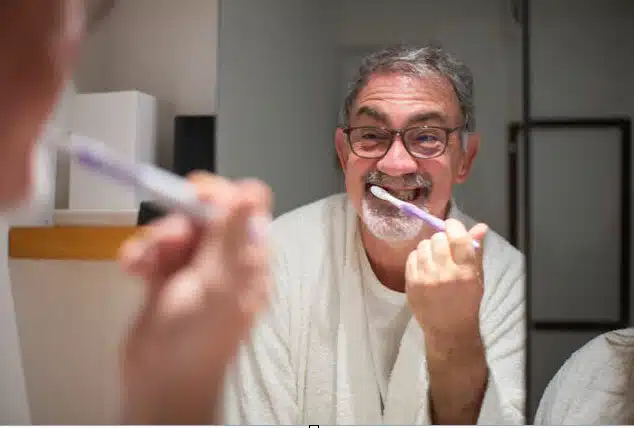Oral Health for Older Adults
When we discuss long-term health for older adults, we often focus on issues like mobility, balance, and cognition, but one critical aspect of health that frequently goes overlooked is oral care.
Many older adults experience oral health challenges that not only affect their ability to eat, speak, and smile, but can also have far-reaching implications for their overall health.
Why oral health matters
Maintaining a healthy mouth is in many ways critical to a positive long-term health outlook. Strong, healthy teeth ensure an older adult can maintain good nutrition and continue eating the foods they enjoy, and the ability to speak clearly and comfortably is the gateway to remaining socially engaged and communicate needs effectively when faced with a challenge. 
Beyond these concerns, oral health can be reflective of a person’s overall health as well. Poor oral health can make it difficult to maintain safe blood sugar levels for those experiencing diabetes, gum disease is believed to be linked to the development of heart disease, and increased bacteria in the mouth can even be passed to the lungs by breathing, increasing the risk for respiratory conditions like pneumonia.
Common oral health hazards for older adults
- As we age, our ability to detect thirst can decrease with time, while certain medications can also reduce our body’s ability to produce saliva. Dry mouth, or Xerostomia, can make it harder to speak, chew, and swallow, and increases the risk of cavities, gum disease, and bad breath.
- Tooth decay becomes a greater concern as we age. Many older adults experience gum recession, which exposes more of their teeth to bacteria, which when combined with a drier mouth, can result in cavities and the eventual loss of a tooth.
- Gum disease becomes increasingly common as we age. While the direct link is still debated among medical professionals, there appears to be a link between heart disease and diabetes to gum disease, which can result in chronic inflammation of the gums, resulting in bleeding and discomfort.
Best Practices for Maintaining Good Oral Health
- Regular Brushing and Flossing: Brushing at least twice a day with fluoride toothpaste and flossing daily helps prevent plaque buildup, cavities, and gum disease.
- Regular Dental Checkups: Even if there are no obvious issues, regular dental visits are essential for early detection of problems and professional cleanings. Ideally, you should be seeing a dentist twice a year for a routine cleaning and screening.
- Stay Hydrated: Drinking plenty of water throughout the day helps combat dry mouth, promotes saliva production, and keeps the mouth clean.
- Healthy Diet: Eating a well-balanced diet rich in vitamins and minerals, especially calcium and vitamin D, supports healthy teeth and gums. Avoid sugary snacks and drinks.
Supporting oral health for older adults
Dental hygiene activities like brushing and flossing, attending dental appointments, and building healthy menus can all become more challenging when an individual faces other health challenges.
While adopting some tools like electric toothbrushes and dental water picks can aid in maintaining a healthy mouth, sometimes more assistance is needed.
Dental hygiene activities, meal preparation, and assistance with safe travel all fall under the normal scope of work for home health care plans, and having a helping hand in the home can be a vital support for those who face challenges performing these activities on their own, while still providing a good balance of personal independence.
If you or a loved one are struggling with the daily upkeep needed to maintain good oral health, now might be the time to consider home health care.
The team at SelectCare has 40 years of experience helping New Yorkers live happier, healthier lives in their longtime homes. To learn more about how we help, call SelectCare, read testimonials from past and current clients, or request a free in-home health care guide today.
Contact us any time, 24/7 with any questions, or to request a free in-home evaluation.